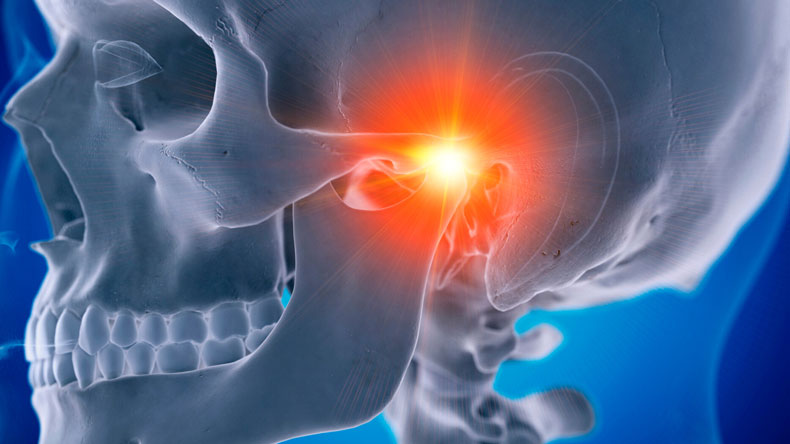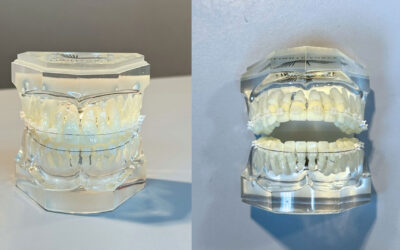Temporomandibular joint disorder (TMD) is a multifaceted condition that affects millions worldwide, characterized by pain, dysfunction, and discomfort in the jaw joint (TMJ) and surrounding muscles. While the primary symptoms of TMD are often associated with the jaw, research suggests a compelling link between TMD and other seemingly unrelated conditions, such as tinnitus and vertigo, a relationship that has been studied since the late 1800’s. In this blog post, we’ll delve into the intricate relationship between TMD, tinnitus, and vertigo, uncovering the underlying connections and exploring how comprehensive management approaches can offer relief for individuals experiencing these interconnected symptoms.
Understanding TMD

TMD encompasses a range of disorders affecting the temporomandibular joint (TMJ), which connects the jawbone to the rest of the skull. Common symptoms of TMD include jaw pain, locking, clicking or popping sounds in the jaw joint, difficulty chewing, and limited jaw movement. While the exact cause of TMD could be elusive, contributing factors may include jaw misalignment, muscle tension, trauma to the jaw joint, or degenerative joint diseases.
The Link Between TMD and Tinnitus
Tinnitus, characterized by the perception of ringing, buzzing, or other phantom noises in the ears, is a common symptom reported by individuals with TMD. While the exact mechanisms underlying this association are still being studied, researchers believe that the proximity of the temporomandibular joint to the middle ear may play a role. Several theories are proposed to explain the relationship between TMD and tinnitus, including neuromuscular interactions, shared embryological origins, and psychological factors. Dysfunction in the TMJ can often lead to changes in the surrounding muscles and tissues, affecting the auditory system and potentially contributing to the development or exacerbation of tinnitus in certain individuals.
While the relationship between these conditions is still vague and multifaceted, studies indicate that reduction in tinnitus symptoms often occurs after the treatment of TMD in many individuals, suggesting a potential causal relationship between the two. This emphasizes the importance of addressing TMD in patients with co-occurring tinnitus.
It’s essential to recognize that tinnitus can have multiple contributing factors, and TMD is just one potential factor among many. Not all individuals with TMD experience tinnitus, and not all individuals with tinnitus have TMD. The exact mechanisms by which TMD might influence tinnitus are not fully understood, and further research is needed to elucidate this relationship definitively.
Exploring the Connection to Vertigo
Vertigo, a sensation of spinning or dizziness, is another symptom that has been linked to TMD. Some individuals with TMD report experiencing episodes of vertigo, often accompanied by other symptoms such as nausea, imbalance, or visual disturbances. Similar to the relationship with tinnitus, the precise mechanisms linking TMD and vertigo are not fully understood, but it is believed that disruptions in the balance mechanisms of the inner ear may be influenced by dysfunction in the jaw joint or surrounding muscles. Several studies have suggested a higher prevalence of vertigo in individuals with TMD, and vice versa. This association raises questions about the potential relationship between the two conditions and whether TMD can contribute to the development or exacerbation of vertigo symptoms.
One proposed mechanism for the link between TMD and vertigo involves dysfunction in the temporomandibular joint (TMJ) and associated structures, which may impact the vestibular system. Especially if TMJ inflammation and edema are present this could create a considerable amount of pressure in the inner ear. The vestibular system plays a crucial role in maintaining balance and spatial orientation, and any disruption to this system, such as dysfunction in the TMJ, could potentially lead to vertigo symptoms.
Additionally, TMD-related muscle tension and changes in posture or head position may also contribute to vertigo symptoms. Dysfunction in the TMJ and surrounding muscles could potentially affect the proprioceptive input to the brain, leading to altered perceptions of balance and spatial orientation.
However, it’s important to note that the exact mechanisms underlying the relationship between TMD and vertigo are not fully understood, and further research is needed to clarify this connection definitively. Additionally, not all individuals with TMD experience vertigo, and not all individuals with vertigo have TMD, indicating that other factors may also contribute to the development of vertigo symptoms.
Comprehensive Management Approaches
Given the complex interplay between TMD, tinnitus, and vertigo, effective management requires a comprehensive approach tailored to each individual’s specific needs. Treatment strategies may include:
- Lifestyle Modifications: Adopting healthy lifestyle habits, such as stress management techniques, dietary modifications, and ergonomic adjustments, can complement treatment efforts and improve overall well-being.
- Orthodontic Interventions: Addressing underlying jaw misalignments or malocclusions through orthodontic treatment may help alleviate symptoms of TMD and reduce associated tinnitus or vertigo.
- TMJ Health and Related Therapy: Techniques such as oral appliance therapy, physical therapy, or relaxation exercises can help relieve muscle tension, improve jaw function, and reduce symptoms of TMD.
- Multidisciplinary Collaboration: Collaboration between healthcare professionals, including dentists, otolaryngologists, and physical therapists, can facilitate comprehensive evaluation and management of TMD-related symptoms.
The relationship between TMD, tinnitus, and vertigo is complex and multifaceted, requiring a thorough understanding and integrated approach to management. By addressing underlying factors contributing to TMD and its associated symptoms, individuals can experience relief and improved quality of life. If you or someone you know is experiencing symptoms of TMD, tinnitus, or vertigo, we encourage you to seek evaluation and treatment from a qualified healthcare professional like Dr. Daia. Together, we can work towards restoring balance and alleviating discomfort for a healthier, happier life.




